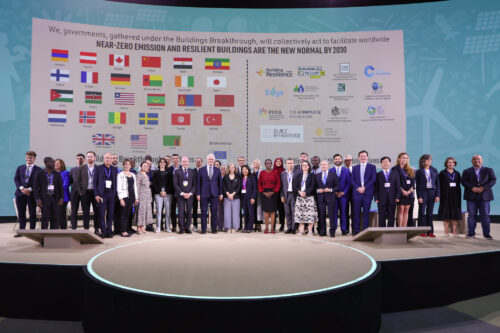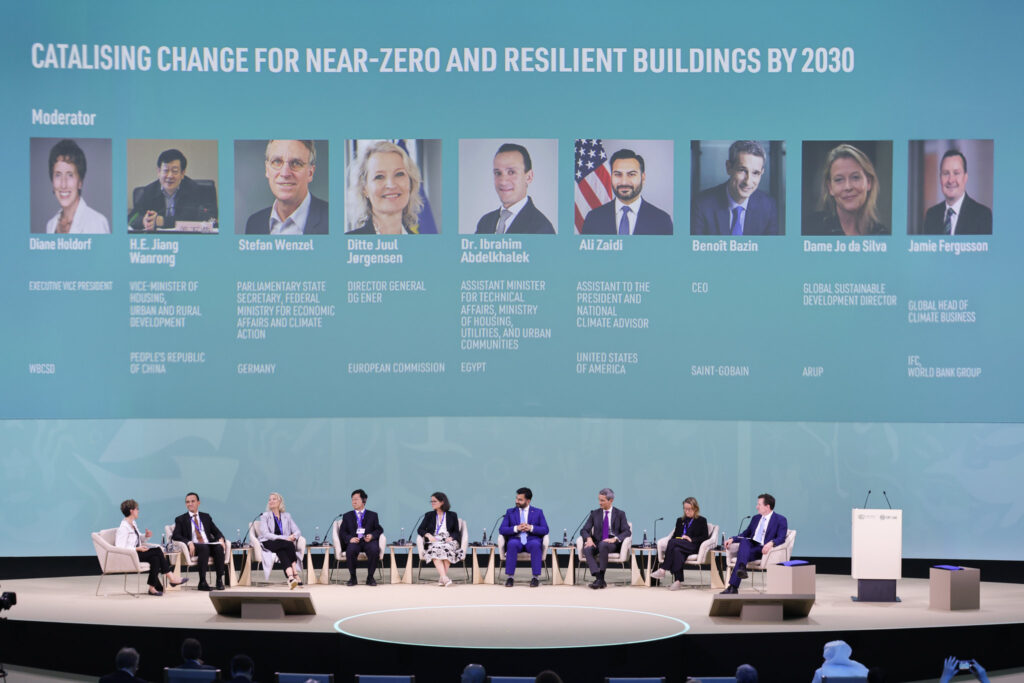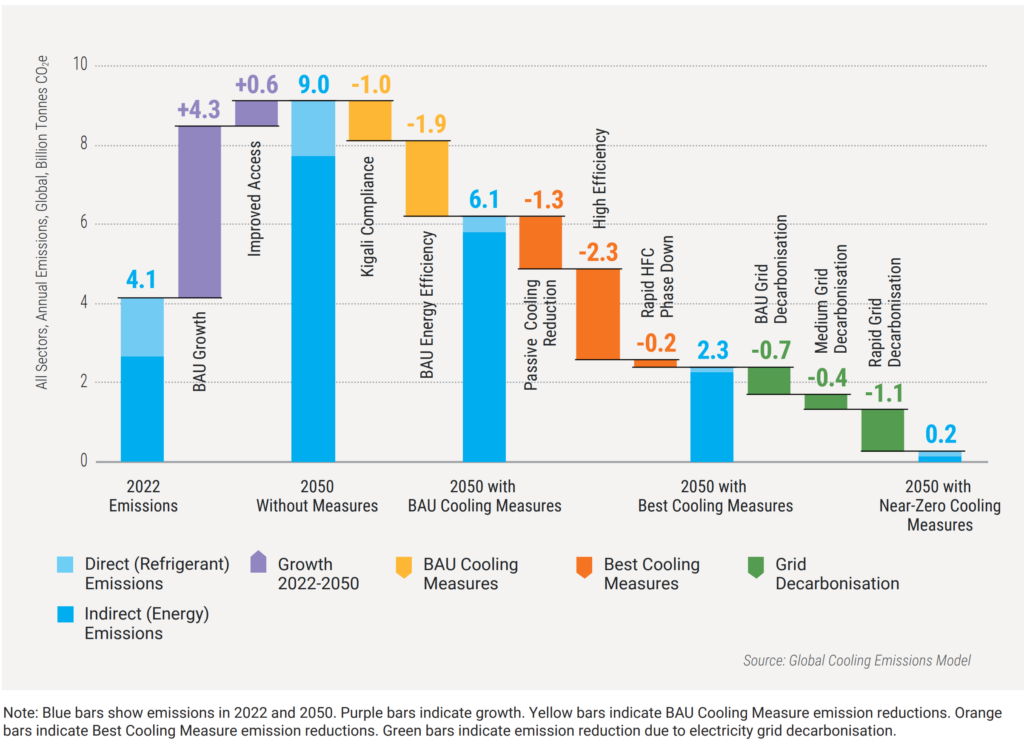
Reshaping the Future of Heating and Cooling
Two hope-inspiring initiatives — the Global Cooling Pledge and Buildings Breakthrough — are unveiled at COP28.
This past year was officially the hottest year on record. As more regions across the globe require greater access to air conditioning, many of today’s units contribute to climate change due to their high electricity consumption and use of refrigerants with high global warming potential, creating a vicious cycle. Regions with colder climates contribute to the problem as well, with nearly 10 percent of global climate pollution coming directly from burning fossil fuels in buildings — most frequently with oil and gas furnaces and boilers.
Against this backdrop, two hope-inspiring initiatives that could help reshape the future of both cooling and heating were launched at the UN climate change conference, COP28, in Dubai, UAE — one of the hottest places on Earth. In collaboration with the United Nations Environment Programme (UNEP), the COP28 Presidency announced the Global Cooling Pledge, which calls for cooling-related emissions to be reduced by at least 68 percent and equipment efficiency improved by 50 percent by 2050 compared to 2022 levels. Over 60 countries, including major players like the United States, Brazil, and the UK, endorsed the pledge, signaling a growing global commitment to sustainable cooling.

More than two dozen countries joined the Buildings Breakthrough partnership launch at COP28 in Dubai, UAE. Image credit: COP28
On the heels of this pledge, the Governments of France and Morocco, alongside UNEP, launched the Buildings Breakthrough, an initiative administered by UNEP’s Global Alliance for Building Construction to transform the building sector — which is responsible for almost 40 percent of global greenhouse gas emissions — into one dominated by near-zero emissions and climate-resilient structures by 2030.
The 28 countries that pledged their commitment to the Buildings Breakthrough account for half of global greenhouse gas emissions and represent a third of the global population. The new initiative is part of the Breakthrough Agenda introduced at COP26 to ensure clean technologies and sustainable solutions are the most accessible, affordable, and attractive options globally.
Below we’ll look at each of these initiatives, why they matter, and what role RMI plays in advancing their goals.
The Global Cooling Pledge and Global Cooling Watch 2023 Report
Image: Global pathway and key steps to achieve near-zero GHG emissions from cooling in 2050, UN Environment Programme Cool Coalition
In support of the Global Cooling Pledge, the UNEP-led Cool Coalition introduced the Global Cooling Watch 2023 report, Keeping It Chill: How to Meet Cooling Demands while Cutting Emissions. This groundbreaking report, which RMI experts contributed to, provides a holistic view of the cooling sector, and shows how cooling sits at the intersection of climate, health, and equity. Here are three key takeaways from this report that you should know:
- The findings project a doubling of electricity consumption needed for cooling by 2050 under current policies. The residential sector is projected to see the fastest growth, and total cooling emissions are expected to surge to between 4.4 billion and 6.1 billion tons of carbon dioxide equivalent in 2050 — more than 10 percent of global projected emissions that year. New policies must be enacted to avoid this outcome.
- Meeting this heightened cooling demand sustainably presents one of the biggest challenges but also one of the greatest opportunities to equitably ensure the health and well-being of people and the planet. This requires 1) passive strategies to reduce cooling demand at urban scale, in buildings and in the cold chain (food refrigeration); 2) scaled up adoption of high-efficiency active cooling technologies and stringent efficiency standards; and 3) shifting to faster adoption of low-global warming potential refrigerants and improved refrigerant management.Achieving near-zero emissions from cooling by 2050 alongside improving access to cooling to vulnerable populations will be difficult, but it is possible. By combining innovative technologies with implementation of synergistic policies, regulations, training, and financial instruments, we can make cooling access a reality for all without exacerbating climate-warming emissions.
Following the report’s recommendations would not only significantly reduce strain on electric grids but also avoid trillions in power generation investments. It could also lower projected 2050 emissions from business-as-usual cooling by around 3.8 billion tons of CO2 equivalent and reduce electricity bills for end users by $17 trillion cumulatively between 2022 and 2050.
RMI’s Role — Making Sustainable Cooling the Norm
RMI has been a consistent leader in accelerating sustainable cooling solutions. With initiatives like the Global Cooling Prize and collaborations with the Clean Cooling Collaborative, we actively engage in commercializing super-efficient residential air conditioning technologies. In key markets like India, we’re working with manufacturers, local authorities, and leading real estate developers such as Lodha to demonstrate, validate, and scale up the adoption of passive measures and next-generation air conditioning products with low environmental impact. RMI’s Third Derivative focuses on accelerating the market entry of advanced cooling technologies and business model innovations.
Buildings Breakthrough
Facing the pressing issue that the buildings sector is not on track to meet mid-century climate targets, the Buildings Breakthrough initiative is setting out to be an arena for international collaboration and increased ambition. It aims to align global standards, leverage finance and investment resources, accelerate demand creation, and advance workforce capacity and skills.
Clean heating solutions, notably heat pump technologies, have emerged as pivotal in decarbonizing the building sector. Heat pumps, with their ability to transfer heat from the air, ground, or other sources, have seen significant global adoption. Despite a commendable 11 percent growth in global heat pump sales in 2022, and policies like the US Inflation Reduction Act that are anticipated to further drive market development, more ambitious efforts are needed to get these all-electric appliances into millions of more buildings to replace fossil fuel systems.
RMI’s Role — Advancing Clean Heat Globally
At COP26 in Glasgow, Scotland, RMI partnered with the UK and other supporting governments to launch the Clean Heat Forum, an effort to advance clean heating solutions globally. The Clean Heat Forum is a project under the UN’s GlobalABC and continues to be managed by RMI, the UK Department for Energy Security and Net Zero, and Scotland Department of Energy & Climate Change, with additional support from E3G and the Regulatory Assistance Project. One of the first supporting initiatives of the Buildings Breakthrough, the Clean Heat Forum will work to bolster the Breakthrough’s efforts to advance reductions from operational emissions from buildings.
While we have clean heating solutions — like highly efficient heat pumps, district energy solutions, deep retrofits, and integrative building design — at our fingertips, adoption has lagged, and these solutions remain inaccessible for too many home and building owners. By bringing public and private sector leaders together, the Clean Heat Forum is filling a critical gap and enabling participating countries, regions, cities, companies, and organizations to co-create and share best practices, policies, standards, and public engagement strategies to reduce building emissions.
Closing the Loop: Doubling Efficiency for a Livable Climate
As we reflect on the developments of COP28, it is evident that doubling efficiency rates across the global economy by 2030 is critical to realizing the climate future we want to see. Electrified and efficient cooling and heating will play a pivotal role in mitigating the impacts of climate change on a global scale. The Global Cooling Pledge and Buildings Breakthrough initiatives both set the stage for more coordination among policymakers, businesses, and industries to achieve a sustainable built environment. The time to accelerate the transition to clean, efficient, and affordable cooling and heating solutions to protect both people and the planet is now.
